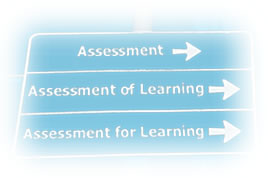

Links - Papers and Articles - Theory in Assessment
Brookhart, S. M. (2004). Classroom Assessment: Tensions and Intersections in Theory and Practice. Teachers College Record, 106(3), 429-458. ![]()
This article explores how intersections of different areas of study have played out in the classroom assessment literature over the last 20 years. Some literature has emphasized one practical function or theoretical tradition; some literature has blended several
Cumming, J. & Maxwell, G.S. (2004) Assessment in Australian schools: current practice and trends. Assessment in Education, 11(1), 89-108. ![]()
This paper explores ten common themes concerning assessment practice in Australian education across the six states and two territories.
Dysthe, O. & Engelsen, K. S. (2004).Portfolios and assessment in teacher education in Norway: a theory-based discussion of different models in two sites. Assessment & Evaluation in Higher Education. 29(2), 239-258. ![]()
In this paper we present a model of analysis for portfolio processes based on sociocultural perspectives of learning and assessment and describe and discuss differences and similarities of the portfolio models in these institutions in relation to our model of analysis
Linn, R. L. (2001). Assessments and accountability (condensed version). Practical Assessment, Research & Evaluation, 7(11). ![]()
This Digest discusses significant features of present-day assessment programs and offers recommendations to increase positive effects and minimize negative ones
McTighe, J., & O'Connor, K. ( 2005 ). Seven Practices for Effective Learning. Educational Leadership, 63 ( 3 ), 10 - 17 . ![]()
Oˇ¦Donovan B., Price, M., & Rust, C. (2004) Know what I mean? Enhancing student understanding of assessment standards and criteria, Teaching in Higher Educational, 9, 325-335. ![]()
In this paper, with reference to both empirical evidence and the literature, we propose a conceptual framework for the transfer of knowledge of assessment criteria and standards that encompasses a spectrum of tacit and explicit processes, which has proven to be effective in practice in improving student performance.
Osmundson, E., Chung, G., Herl, H. & Klein, D. (1999). Knowledge mapping in the classroom: a tool for examining the development of studentsˇ¦ conceptual understandings. ![]()
The objective of this study was to investigate how computer-based knowledge mapping could be used simultaneously as an instructional tool and an assessment tool in a classroom setting
Shepard, L. (2003). The Hazards of High-Stakes Testing. Issues in Science and Technology, 19(2), 53-59. ![]()
Shepherd, L. (1991). Will national tests improve student learning? Phi Delta Kappan, 73, 232-238. ![]()
The paper is organized in three parts. Part I is a summary of research evidence on the negative effects of standardized testing. In Part II, the National Education Goals Panel's (NEGP) vision of national examinations is presented . In Part III, curricular and
technical problems are identified that have to be resolved before the vision of the NEGP can be achieved.
Stiggins, R. J. (1999). Assessment, Student Confidence, and School Success. Phi Delta Kappan, 81(3), 191-198. ![]()
Mr. Stiggins questions the notion that intimidation by assessment will lead to more effective schools, and he offers an alternative vision in which we use assessment to build student confidence in the service of school improvement.
Wynne, H. (2003). Enhancing Inquiry Through Formative Assessment. San Francisco, CA:Exploratorium. ![]()
This monograph sets out research evidence and theoretical points supporting the claim that effective formative assessment can raise student achievement. Due to the nature of formative assessment, however, the benefits cannot be secured without considerable change in education policy and practice. To that end, the final section of this document examines the actions required to bring about these changes.
Yorke, M. (2003). Formative assessment in higher education: Moves towards theory and the enhancement of pedagogic practice. Higher Education, 45 (4), 477-501. ![]()
In this paper, a sketch is offered of the direction that theoretical development in respect of formative assessment might take. It is noted that formative assessment may be either constructive or inhibitory towards learning. Suggestions are made regarding research into formative assessment, and how research might contribute to the development of pedagogic practice.
Home | Purposes | Background | Research Plan | Team | Schools | Works | Links